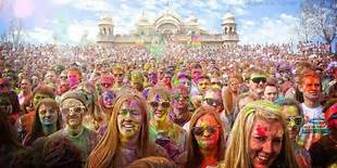
"When you come into the land that I give to you, the land will rest a Shabbat for the Divine..."
The Torah reading Parshat Behar opens by talking about Shabbat not as a day of rest for people, but as a rest for the land. It says:
Ki tavo’u el ha’aretz asher ani notein lakhem, v’shavta ha’aretz Shabbat laShem- When you come into the land that I give to you, the land will rest a Shabbat for the Divine. It then goes on to explain what it means for the land to rest: "Sheish shanim tizra sadekha v’sheish shanim tizmor karmekha v’asafta t’vuatah- "Six years your will plant your field, prune your vineyard and gather in your produce. "Uvashana hashvi’it Shabbat shabbaton yiyeh la’aretz- But the seventh year should be a Sabbath of Sabbaths for the land… don’t plant your field or prune your vineyard..." Now the Torah doesn’t talk much about vegetables. When it refers to planting fields, it’s mostly talking about grain, and from the grain is made the ancient staple, bread. Pruning vineyards is a reference of course to grapes that are made into wine. Now wine and bread are not only basic foods, they’re also sacramental foods- forming the ritual part of sacred meals on Shabbat and festivals. In fact, the first mention of this is in Bereishit 14:18 when Makitzedek, the priest-king of Shalem, blesses Avraham and brings him bread and wine. I heard once from a friend a special teaching that he heard from Rabbi Shlomo Carlbach of blessed memory. He pointed out that wine is something that gets better and better with age. You pay more for wine depending on how old it is. Bread, on the other hand, has to be fresh. No one wants a fifty year-old loaf of bread. Similarly, there’s an aspect of the spiritual path that’s ancient and an aspect that’s fresh and new. For example, the Torah, and really the whole Jewish tradition, is ancient and there’s a special richness in that. And even though there are plenty of passages in the Torah that may seem wrong and even disturbing, that’s offset in a sense by the richness of being connected to a lineage that’s many thousands of years old. And yet, that richness doesn’t really come to life unless it’s combined with fresh, new insights and interpretations. No one wants to hear the same old canonized interpretations over and over again. For the tradition to really live, it also has to be like bread- we need khidushim- new insights. On a deeper level, the very practice of Presence also contains these two aspects. On one hand, there is nothing more ancient than the present moment. There’s nothing that’s ever existed that didn’t exist in the space of its own present. That’s why one of the names of God is Atik Yomin- the Ancient of Days. And when you become fully present to the ancient space of this moment, there’s an intoxication, as you drink in the wine of the Being. At the same time, in becoming present to That which is most ancient, there’s also a spontaneous letting go of mental and emotional baggage from the past so that everything in your experience becomes alive and new like a freshly baked challah. So on this Shabbat B’Har and B’khukotai- the Sabbath of the Mountain and the Decree- may continue to ascend the mountain of transcendence and freedom through both the wine of tradition and the bread of immediacy, bringing that transcendence into the flow of actual life, doing our part to fulfill the decree of tikum olam- transforming this world into a celebration of creation and an expression of love. Good Shabbos!!
0 Comments

"Mo’adei Hashem asher tikr’u otam mikra’ei kodesh, eleh hem mo’adai-
"Special Divine times you are to define as holy gatherings- these are My festivals."
(Inspired by a teaching from Rabbi Menachem Mendel Shneerson- The Rebbe)
The Torah reading Parshat Emor emphasizes the mitzvot of making sacred times- in this case, of setting aside special days in which you put aside all your time-bound agendas so that you can more deeply connect with Eternal dimension of Being. It says, "Mo’adei Hashem asher tikr’u otam mikra’ei kodesh, eleh hem mo’adai- Special Divine times you are to define as holy gatherings- these are My festivals." It then goes on to talk about the various festivals, beginning with Shabbat: "Uvayom hash’vi’i Shabbat Shabbaton- and on the seventh day shall be a Sabbath of Sabbaths." Why does it call Shabbat a Sabbath of Sabbaths? Because ultimately, the purpose of Shabbat- the purpose of the festivals, as well as any other times you set aside for spiritual practice- is not merely to have a special holy experience during those times alone. Rather, the purpose is to immerse in the Eternal dimension of Being so that you can continue to practice Presence even as you operate in the mundane world of time. In that way, all times become like a Sabbath, and the actual Sabbath is then a Sabbath of Sabbaths. Because as we all know, there are many forces of distraction on many levels that block the sense of life being a Sabbath. But when you regularly put those distractions aside in order to do your spiritual practice, you give yourself that space you need and allow the Eternal dimension of Being to blossom more and more into all your life. So what does it mean to put aside the things of ordinary time? As it says, "...mikra kodesh- a sacred time- kol melakha lo ta’asu- all melakha, that is all work, don’t do." Meaning, anything that has goals in time such as earning a livelihood, traveling, planning, working on projects- all those things that define your life in time, as opposed to your actual life- that sense of simply Being, as you are, right now, don’t do that stuff. Make sure you have some special times that are sacred. So on this Shabbat Emor, the Sabbath of saying, may we say out loud to ourselves our commitment to set aside time to go beyond time, whether in the traditional practices of Shabbat and the mo’adim, the Sabbath and festivals, or even for just a few seconds throughout the day to stop, breath and be present, perhaps even putting away phones and computers. May the whole world be nourished by our commitment to practice, that we might be greater channels of love and healing in the world. Good Shabbos! 
"Speak to the entire assembly of the children of Israel and say to them-
"Kedoshim tihyu ki kadosh ani Hashem Eloheikhem- "Holy you shall be, because holy am I, Hashem your God.”
There’s something strange about this passage. God is telling the children of Israel that they should be holy without really explaining what that means, and then it says that the reason they should be holy because God is holy- ki kadosh ani Hashem Eloheikhem. So the question is, why does one follow from the other? Why should we be holy just because God is holy, and what does holy mean anyway?
The word for holy, Kadosh, actually means “separate,” but not in the ordinary sense. Normally, the word “separate” connotes distance, disconnectedness, or alienation, such as when a relationship goes sour and you lose that connection with another person. But the word kadosh actually means the opposite. In a Jewish wedding ceremony, for example, we hear these words spoken between the beloveds- “At mekudeshet li- “You are holy to me…” Meaning, your beloved becomes kadosh or “separate” not because they’re separate from you, but because they’re exclusive to you. They’re your most intimate, and therefore separate from all other relationships. So, the separateness of kadosh points not to something that’s distant, but to something that’s most central. It points not to alienation, but to the deepest connection. And just as your beloved is separate from all other relationships, so too when you become present, this moment becomes separate from all other moments, and you’re able to get some distance from the world of time- from your memories about the past and your anticipations of the future. This allows you to experience yourself not as a bundle of thoughts and feelings inhabiting a body, but as the open, radiant space of awareness within which your thoughts and feelings come and go. That’s why your presence, your awareness is by its nature kadosh- separate from the world of thought and feeling within which we tend to get trapped, yet fully and intimately connected with everything that arises in this moment. So when God says kedoshim tihyu- you should be holy- it’s telling you to do the practice of holiness by becoming present- by separating your mind from the entanglements of thought and time. How is it possible for us to get free from time? Ki kadosh ani Hashem Eloheikhem- because the holiness of Being- Hashem- is already your own inner Divinity- Eloheikhem. In other words, by practicing presence, you bring forth your own deepest nature, which is holiness. This is also hinted at in the name of Parshat Akharei Mot, which means “after the death.” In order to know your own deepest nature as shamayim mima’al, the vastness of space, you have to let go of your mind-based identity- all your stories and judgments about yourself, and that can actually feel like a kind of death. But this death has an Akhar- an afterward in which your true life, the awareness that you are, becomes liberated. So on this Shabbat Akharei Mot and Kedoshim may we come to know more deeply the holiness that is felt after the death of the false self, and may we express that holiness as love and blessing to everyone we encounter. Good Shabbos! |
Archives
July 2024
|
 RSS Feed
RSS Feed